“My God, My God, why hast Thou forsaken Me?” – Matthew 27:46
The very word “forsaken” is one of the most tragic in all human speech. This word brings to mind such calamity of a man being forsaken by his friends, a wife forsaken by her husband, a child forsaken by its parents! But here hung a man forsaken by his Creator. A man forsaken by God is the most frightening of all.
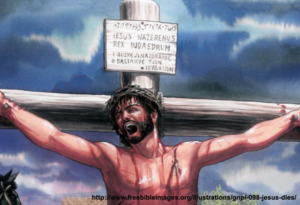 He who hung on the cross had been from all eternity the object of the Father’s love. The Father’s presence had been His home, the Father’s glory He had shared before ever the world was. During the thirty-three years the Son had been on earth He enjoyed unbroken communion with the Father. Never a thought that was out of harmony with the Father’s mind.
He who hung on the cross had been from all eternity the object of the Father’s love. The Father’s presence had been His home, the Father’s glory He had shared before ever the world was. During the thirty-three years the Son had been on earth He enjoyed unbroken communion with the Father. Never a thought that was out of harmony with the Father’s mind.
What must it have meant to be “forsaken” now by God! This was the most bitter ingredient of that cup which the Father had given the Redeemer to drink – the hiding of God’s face from Him.
The soldiers had cruelly mocked Him: they had arrayed Him with the crown of thorns, they had scourged and buffeted Him, they even went so far as to spit upon him and pluck off His hair. They removed His garments and put Him to an open shame.
Yet He suffered it all in silence.
They pierced His hands and feet. The vulgar crowd taunted Him and even the thieves which were crucified with Him flung the same taunts into His face.
Yet He opened not His mouth.
But now, as the wrath of Heaven descended upon Him, He cries, “My God, My God, why hast Thou forsaken Me?”
The Holy Scripture leave it impossible to doubt that these words of unequalled grief were both the fullest manifestation of Divine love and the most awe-inspiring display of God’s inflexible justice.
Sin and the Character of Its Wages
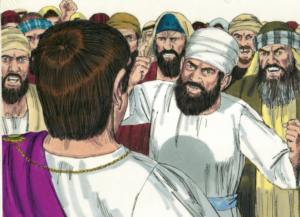 The Lord Jesus was crucified at mid-day, and in the light of Calvary everything was revealed in its true character. Here was fully and finally exhibited the depravity of the human heart. Its hatred to God, its base ingratitude, its loving of darkness rather than light, its preference of a murderer for the Prince of life was clearly displayed.
The Lord Jesus was crucified at mid-day, and in the light of Calvary everything was revealed in its true character. Here was fully and finally exhibited the depravity of the human heart. Its hatred to God, its base ingratitude, its loving of darkness rather than light, its preference of a murderer for the Prince of life was clearly displayed.
Also the awful character of the Devil and his hostility against God was demonstrated. We see first hand the power of the enemy to put such hatred into the hearts of men to betray the Savior. Displayed are the lengths to which sin will go to achieve its goal to destroy all that is good.
Here we see the perfection of the Divine nature of God’s holiness. We see His inflexible justice and His terrible wrath.
The Wages of Sin
Romans 6:23, “The wages of sin is death”.
“By one man sin entered into the world, and death by sin; and so death passed upon all men, for that all have sinned”. Romans 5:12.
Had there been no sin there would have been no death. But what is “death”? Is it that dreadful silence which reigns supreme after the last breath is drawn and body lies motionless? Is it that ghastly pallor which comes over the face as the blood ceases to circulate and the eyes remain expressionless? Yes, it is that and much more.
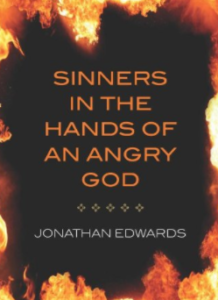 Death is something far more pathetic and tragic than physical dissolution. The wages of sin is spiritual death. Sin separates from God who is the Fount of all life.
Death is something far more pathetic and tragic than physical dissolution. The wages of sin is spiritual death. Sin separates from God who is the Fount of all life.
Previous to the Fall, Adam and Eve enjoyed blessed fellowship with their Maker. But as soon as the guilty pair sinned they hid themselves from God. As a result of sin they no longer enjoyed communion with Him who is always Light, instead, they are alienated from Him.
The wages of sin is death, not only physical but spiritual death.
Now on the Cross the Lord Jesus was receiving the wages which were due His people. He had no sin of His own, for He was the Holy One of God. But He was bearing our sins in His own body on the tree. (1 Peter 2:24)
At The Cross
At the Cross man did a work: he displayed his depravity by taking the Perfect One and with “wicked hands” nailing Him to the tree. At the cross Satan did a work: he manifested his insatiable enmity against the woman’s seed by bruising His heel. At the Cross the Lord Jesus did a work: He died the Just for the unjust that He might bring us to God. At the Cross God did a work. He exhibited His holiness and satisfied His justice by pouring out His wrath on the One who was made sin for us.
The Holiness of God
What human pen is able or fit to write about the Holiness of God!
So holy is God that mortal man cannot look upon Him in His essential Being, and live.
So holy is God that the very heavens are not clean in His sight.
So holy is God that even the seraphim veil their faces before Him.
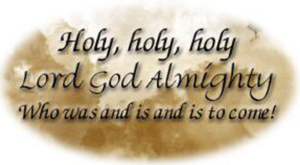 So holy is God that when Abraham stood before Him, He cried, “I am but dust and ashes” (Genesis 18:27).
So holy is God that when Abraham stood before Him, He cried, “I am but dust and ashes” (Genesis 18:27).
So holy is God that when Job came into His presence he said, “Wherefore I abhor myself” (Job 42:6).
So holy is God that when Isaiah had a vision of His glory he exclaimed, “Woe is me! for I am undone . . . for mine eyes have see the King, the Lord of hosts” (Isaiah 6:6)
So holy is God that when Daniel beheld Him in he declared, “there remains no strength in me: for my comeliness was turned in me into corruption” (Daniel 10:8).
So holy is God that we are told, “He is of purer eyes than to behold evil, and canst not look on iniquity” (Hab. 1:13).
And this is why when the Savior was bearing our sins that God would not look on Him. God turned His face from Him and forsook Him. Christ bore the iniquity of us all. Christ was our substitute. Christ was our sin offering for all our offences to appease the wrath of a Holy God.
At the Cross we see God, “spared not His own Son” when He hung in the sinner’s place.
Nature Anticipated the Tragedy
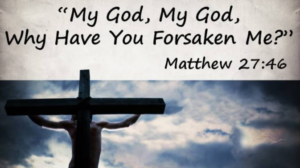 It is noon, and Jesus has been on the cross for three pain-filled hours. Suddenly, darkness falls on Calvary and “over all the land” (Matthew 27:45). By a miraculous act of Almighty God, midday becomes midnight.
It is noon, and Jesus has been on the cross for three pain-filled hours. Suddenly, darkness falls on Calvary and “over all the land” (Matthew 27:45). By a miraculous act of Almighty God, midday becomes midnight.
This supernatural darkness is a symbol of God’s judgment on sin. The physical darkness signals a deeper and more fearsome darkness. It was no eclipse. Competent astronomers tell us that at the time of the Crucifixion the moon was at her farthest from the sun.
But this Bitter Cry of Christ’s gives the meaning of the Darkness, as the Darkness gives us the meaning of the Bitter Cry. Christ had taken the place of guilty and lost ones, that He was in the place of sin-bearing. He was enduring the judgment due His people. Christ suffered the outpouring wrath of God and also the withdrawal of His presence and fellowship.
The Basis of Our Salvation
God is Holy and therefore He will not look upon sin. God is Just and therefore He judges sin wherever it is found. But God is Love as well: God delights in mercy, and therefore infinite wisdom devised a way whereby Justice might be satisfied and mercy to flow out freely to guilty sinners.
This way was the way of Substitution. The Just suffering for the unjust. The Son of God Himself was the one selected to be the Substitute. There was no one else without sin. Through Nahum, the question had been asked, “Who can stand before His indignation? and who can abide in the fierceness of His anger?” (Nahum 1:6)
This question received its answer in the adorable person of our Lord and Savior Jesus Christ. He alone could “stand”. Only one could bear the curse and yet rise a victor above it. Only one could endure all the avenging wrath and yet magnify the law and make it honorable. Only one could suffer His heel to be bruised by Satan and yet in that bruising destroy him that had the power of death.
At the cross we see that boundless love, inflexible justice, and omnipotent power all combined to make possible the salvation of those who believe.
Sins Debt Paid
At the Cross all our iniquities were laid upon Christ and therefore did Divine judgement fall upon Him. There was no way of transferring sin without also transferring its penalty. Both sin and its punishment were transferred to the Lord Jesus. On the Cross Christ was making Propitiation, and propitiation is solely Godward.
It was a question of meeting the claims of God’s holiness. It was a matter of satisfying the demands of His justice. Not only was Christ’s blood shed for us, but it was also shed for God: He “hath given Himself for us an offering and a sacrifice to God for a sweet-smelling savor” (Ephesians 5:2). Thus it was foreshadowed on the memorable night of the Passover in Egypt: the lamb’s blood must be where God’s eye could see it – “When I see the blood, I will pass over you!”
Death of a Curse
The Death of Christ on the Cross was a death of the Curse.
“Christ hath redeemed us from the curse of the law, being made a curse for us, for it is written, Cursed is every on that hangeth on a tree” (Gal.3:13).
The “curse” is alienation from God. This is apparent from the words which Christ will yet speak to those that shall stand on His left hand in the day of His power – “Depart from Me, ye cursed” He will say (Matthew 25:41). The curse is exile from the presence and glory of God.
Christ’s Love on Display
“Greater love hath no man than this, that a man lay down his life for his friends” (John 15:13). The greatness of Christ’s love can be estimated only when we are able to measure what was involved in the “laying down” of His love.
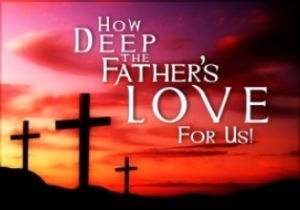 As we have seen it meant much more than physical death, even though that be of unspeakable shame, and indescribable suffering. It meant that he took our place and be “made sin” for us.
As we have seen it meant much more than physical death, even though that be of unspeakable shame, and indescribable suffering. It meant that he took our place and be “made sin” for us.
The greatness of Christ’s love for us can be estimated only when we are able to measure the wrath of God that was poured upon Him. Three hours of unspeakable horror in which the Holy One contemplated that God had forsaken Him.
Now we understand in some small measure why Christ cried in the Garden of Gethsemane, “If it be possible let this cup pass from Me” (Matthew 26:39). But it was not possible. He willingly gave His life on a cruel cross for each and everyone of us.
Have a GREAT day . . . someday it will be HISTORY!

Follow Us!